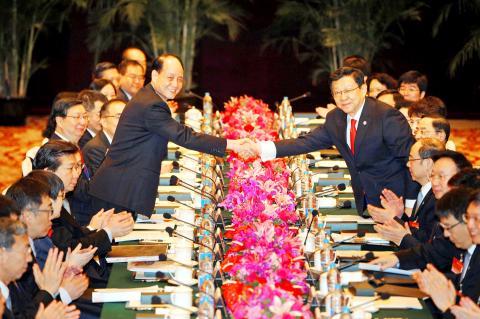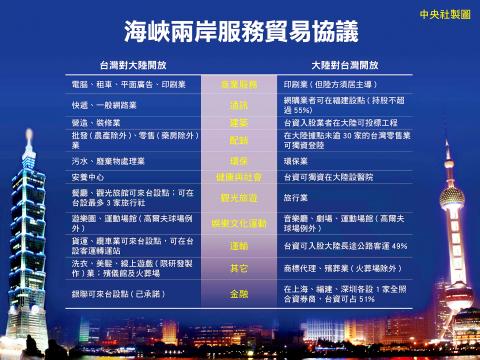The Straits Exchange Foundation and the Association for Relations Across the Taiwan Straits (ARATS) yesterday signed a cross-strait service trade agreement in Shanghai during the ninth round of cross-strait talks, opening the service sectors on both sides to further cross-strait exchanges.
Under the pact, which includes four chapters and 24 articles, 64 Taiwanese industries will be opened to Chinese investment, while China will open up 80 industries to Taiwan.
The Taiwanese industries include transportation, tourism and traditional Chinese medicine, while China will open up its finance, retail, electronics, publishing and travel sectors.

Photo: CNA
Under the agreement, Chinese investors will be allowed to open hotels in Taiwan.
Taiwan will also allow Chinese travel agencies to establish a maximum of three branches in the country and provide services to Taiwanese. However, they will not be allowed to accommodate any foreign tourists, including Chinese.
Taiwanese investors will be allowed to set up travel agencies in China, as well as open restaurants or hotels.

Photo: CNA
Chinese companies will be allowed to open beauty parlors or hair salons in Taiwan, but would only be allowed to employ Taiwanese.
While China will open its publishing industry to Taiwanese investment, Taiwan will allow Chinese companies to invest in Taiwanese businesses in the printing service industry, with a maximum of 50 percent stock ownership.
On financial services, Taiwanese companies will be allowed to invest security companies in Shanghai, in Shenzhen and Chinese-controlled Fujian Province.
In signing the pact, foundation Chairman Lin Join-sane (林中森) and ARATS Chairman Chen Deming (陳德銘) both lauded the agreement for deepening cross-strait exchanges in the service sector.
Lin said 80 percent of the deal opens the two sides’ service sectors to the same or greater degree as the Closer Economic Partnership Arrangement (CEPA) that was signed between Hong Kong and China in 2003, with 90 percent of financial services covered in the cross-strait agreement opened, just like in the CEPA.
The cross-strait service trade agreement is a major follow-up to the Economic Cooperation Framework Agreement (ECFA) and the General Agreement on Trade in Services under the WTO.
“The service trade agreement is a pact that benefits related sectors across the Taiwan Strait and promotes the interests of the public on both sides. It will result in a win-win situation for both sides,” Lin said.
After signing the pact, Taiwan and China cannot revise or cancel the agreement within the next three years.
The two sides will hold an annual meeting to review the implementation of the pact.
The agreement also includes an emergency negotiation mechanism, which gives related industries from each side the right to demand negotiations and seek solutions if the agreement negatively affects their businesses sectors.

SECURITY: As China is ‘reshaping’ Hong Kong’s population, Taiwan must raise the eligibility threshold for applications from Hong Kongers, Chiu Chui-cheng said When Hong Kong and Macau citizens apply for residency in Taiwan, it would be under a new category that includes a “national security observation period,” Mainland Affairs Council (MAC) Minister Chiu Chui-cheng (邱垂正) said yesterday. President William Lai (賴清德) on March 13 announced 17 strategies to counter China’s aggression toward Taiwan, including incorporating national security considerations into the review process for residency applications from Hong Kong and Macau citizens. The situation in Hong Kong is constantly changing, Chiu said to media yesterday on the sidelines of the Taipei Technology Run hosted by the Taipei Neihu Technology Park Development Association. With

CARROT AND STICK: While unrelenting in its military threats, China attracted nearly 40,000 Taiwanese to over 400 business events last year Nearly 40,000 Taiwanese last year joined industry events in China, such as conferences and trade fairs, supported by the Chinese government, a study showed yesterday, as Beijing ramps up a charm offensive toward Taipei alongside military pressure. China has long taken a carrot-and-stick approach to Taiwan, threatening it with the prospect of military action while reaching out to those it believes are amenable to Beijing’s point of view. Taiwanese security officials are wary of what they see as Beijing’s influence campaigns to sway public opinion after Taipei and Beijing gradually resumed travel links halted by the COVID-19 pandemic, but the scale of

A US Marine Corps regiment equipped with Naval Strike Missiles (NSM) is set to participate in the upcoming Balikatan 25 exercise in the Luzon Strait, marking the system’s first-ever deployment in the Philippines. US and Philippine officials have separately confirmed that the Navy Marine Expeditionary Ship Interdiction System (NMESIS) — the mobile launch platform for the Naval Strike Missile — would take part in the joint exercise. The missiles are being deployed to “a strategic first island chain chokepoint” in the waters between Taiwan proper and the Philippines, US-based Naval News reported. “The Luzon Strait and Bashi Channel represent a critical access

Pope Francis is be laid to rest on Saturday after lying in state for three days in St Peter’s Basilica, where the faithful are expected to flock to pay their respects to history’s first Latin American pontiff. The cardinals met yesterday in the Vatican’s synod hall to chart the next steps before a conclave begins to choose Francis’ successor, as condolences poured in from around the world. According to current norms, the conclave must begin between May 5 and 10. The cardinals set the funeral for Saturday at 10am in St Peter’s Square, to be celebrated by the dean of the College